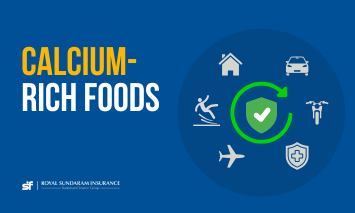Calcium-Rich Foods
Mar 24, 2025 • 3 Min Read
Calcium, the most abundant mineral in the human body, plays a crucial role in maintaining bone health, muscle function and overall well-being. Therefore, it's essential to include foods containing calcium in your diet for your optimal health.
In this blog, we have curated a list of some calcium-rich foods and their benefits along with some healthy recipes that you can enjoy to the fullest.
Top Calcium-Rich Foods
Before we move forward to more about foods high in calcium, do you know how much calcium the human body needs?
According to the National Institutes of Health, below is the list of average daily recommended amounts –
| Criteria | Calcium Amount | |
|---|---|---|
| Birth to 6 months | 200 mg | |
| 7 to12 months (Infants) | 260 mg | |
| 1 to 3 years (Children) | 700 mg | |
| 4 to 8 years (Children) | 1,000 mg | |
| 9 to 18 years (Children / Teens) | 1,300 mg | |
| 19 to 50 years (Adults) | 1,000 mg | |
| 51 to 70 years (Men) | 1,000 mg | |
| 51 to 70 years (Women) | 1,200 mg | |
| 71 years and older | 1,200 mg | |
Calcium is present in both food and drinks. Here are some of the top calcium-rich foods -
Milk: When we talk about calcium sources, milk is the first item that comes to everyone's mind. It is indeed a powerhouse loaded with calcium that is both easily absorbable and digestible. It is a good source of proteins, vitamin A and vitamin D.
- 1 cup (237 ml) of cow's milk has 306 - 325 mg of calcium (depending on whether it's whole or non-fat milk).
- 1 cup (237 ml) of goat's milk has 327 mg of calcium.
Leafy Greens: Leafy green vegetables, such as spinach, kale and collard greens, are incredibly healthy and some of the best sources of calcium. They also contain nutrients like vitamin K, which is essential for bone health.
- 1 cup (190 grams) of cooked collard greens has 268 mg of calcium.
- 1 cup of cooked kale has 180 mg of calcium.
- 1 cup of cooked spinach has 130 mg of calcium.
Fortified Foods & Drinks: Many foods, especially plant-based alternatives, like breakfast cereals, soy milk, orange juice and non-dairy milk, are fortified with calcium to enhance their nutritional value.
- 1 cup (237 ml) of fortified soy milk has 60 mg of calcium.
- 1 glass of fortified orange juice has 300 mg of calcium.
- 1 bowl of fortified cereal has 100 mg of calcium.
Nuts and Seeds: Almonds are among the highest calcium-rich foods among all nuts. Along with nuts, chia, sesame, poppy seeds and celery seeds are also rich in calcium.
- 1-ounce toasted almonds contains 80 mg of calcium.
- 1-ounce whole roasted sesame seeds contains 280 mg of calcium.
Beans and Lentils: These are versatile sources of calcium that are also rich in fibre, protein and micronutrients. Here's how they contribute to your diet intake –
- 0.5 cup of boiled soybeans has 100 mg of calcium.
- 1 cup of cooked garbanzo and pinto beans has 80 and 75 mg of calcium, respectively.
Cheese & Yoghurt: The next top calcium-rich food is yoghurt, which contains probiotics and supports gut health. Along with that, cheese is a delicious way to add calcium to your diet, but it is worth remembering that it's higher in fat and calories compared to milk and yoghurt.
- 1 cup of yoghurt has 450 mg of calcium.
- 12-ounce yoghurt drink has 300 mg of calcium.
- 1-ounce hard cheese (cheddar, jack) has 200 mg of calcium.
- 1 tbsp. of parmesan cheese has 70 mg of calcium.
Benefits
Foods high in calcium offer a multitude of benefits for overall health and well-being. Here are some of the key advantages –
Bone Health
99% of the calcium in the human body is in bones and teeth. So, it is essential for the development, growth and maintenance of bone, reducing the risks of osteoporosis and fractures.
Muscle Functioning
Calcium plays a critical role in muscle function, specifically in the process of muscle contraction and relaxation.
Regulation of Blood Pressure
Adequate calcium intake has been linked to the regulation of blood pressure levels. It reduces the risk of hypertension and related cardiovascular diseases.
Blood Clotting
Calcium is necessary for the blood clotting process. It relaxes the smooth muscle surrounding blood vessels and is crucial for wound healing and preventing excessive bleeding.
Reduced Risk of Chronic Disorders
The risk of various chronic diseases can be reduced to a great extent with proper calcium intake.
Recipes and Tips
Eating calcium-rich foods should not be boring; here are some simple recipes that are both healthy and tasty.
Fruit & Yoghurt Smoothie
To make this smoothie, all you need is yoghurt, fruit juice and frozen fruit. Blend them well and make a healthy breakfast in less than 10 minutes.
Salmon & Quinoa Salad
For a nutritious and satisfying meal, combine grilled salmon, cooked quinoa, diced vegetables and a sprinkle of sesame seeds. Add salad dressing to taste.
Tofu & Vegetable Stir-Fry
Stir-fry tofu with your favourite vegetables and toss it with a flavorful sauce made from soy sauce, ginger, and garlic for a quick and calcium-rich dinner option.
Spinach Feta Stuffed Chicken
Fill chicken breasts with a mixture of spinach, feta cheese, and garlic, then bake until cooked properly.
Conclusion
Incorporating calcium-rich foods into your diet is crucial. From dairy products like cheese and yoghurt to plant-based options such as leafy greens, nuts and seeds, there are plentiful and delicious ways to meet your daily calcium needs.
However, it's also important to safeguard your health beyond just nutrition by Royal Sundaram Health Insurance for your peace of mind and stability. Find the right plan for you and your family and manage healthcare needs and financial well-being.



Discover the perfect insurance plan for you!
Get your free quote now!
Get StartedBy Clicking on Get Started, You agree to our Terms and Conditions and override DNC/NDNC registration.
More like this
View more





